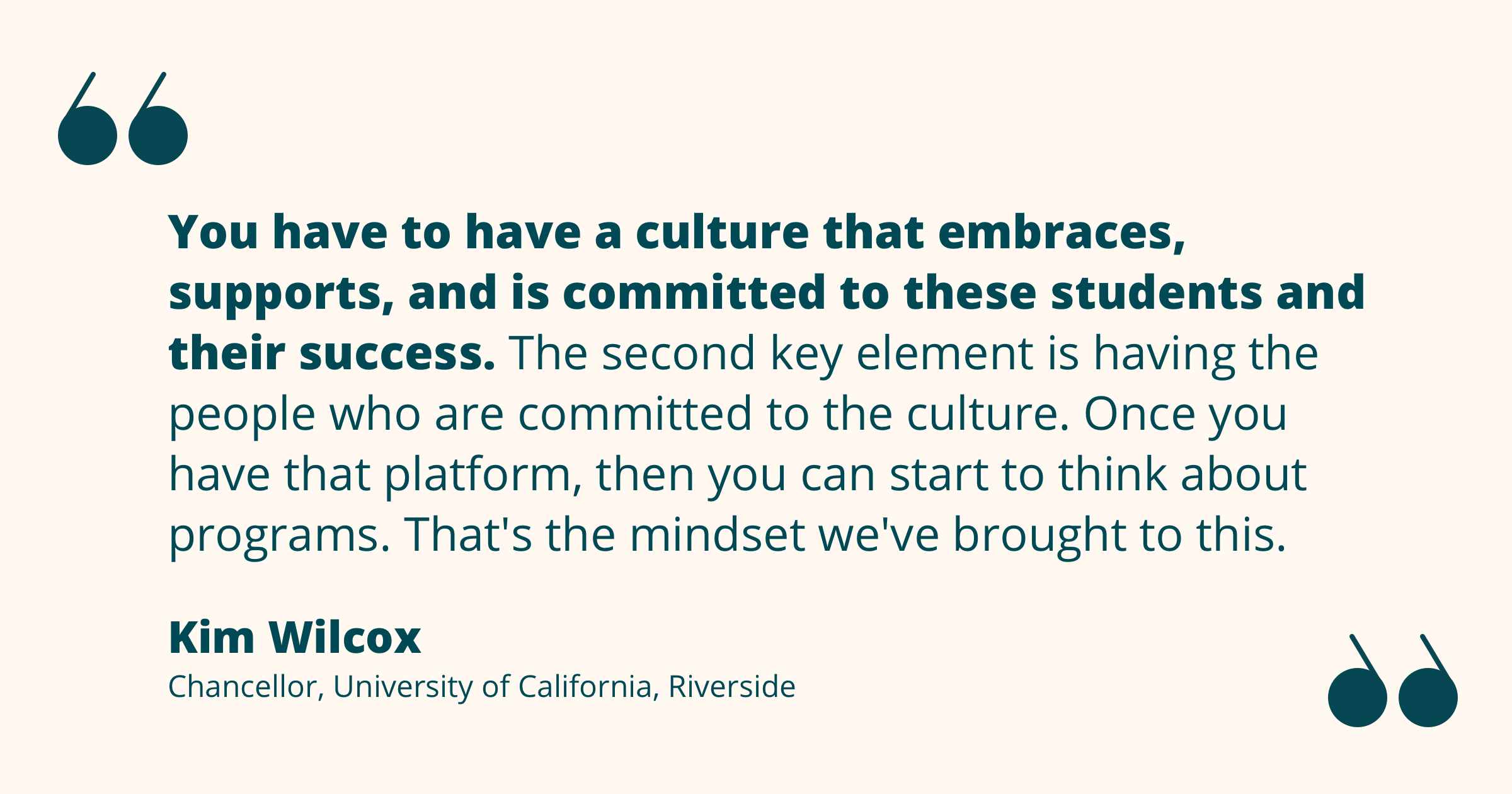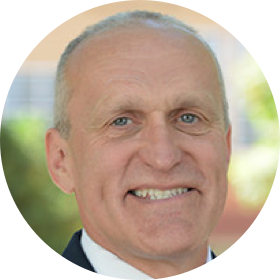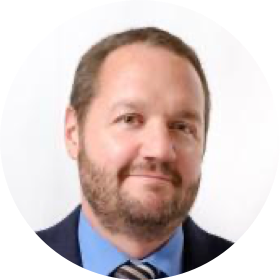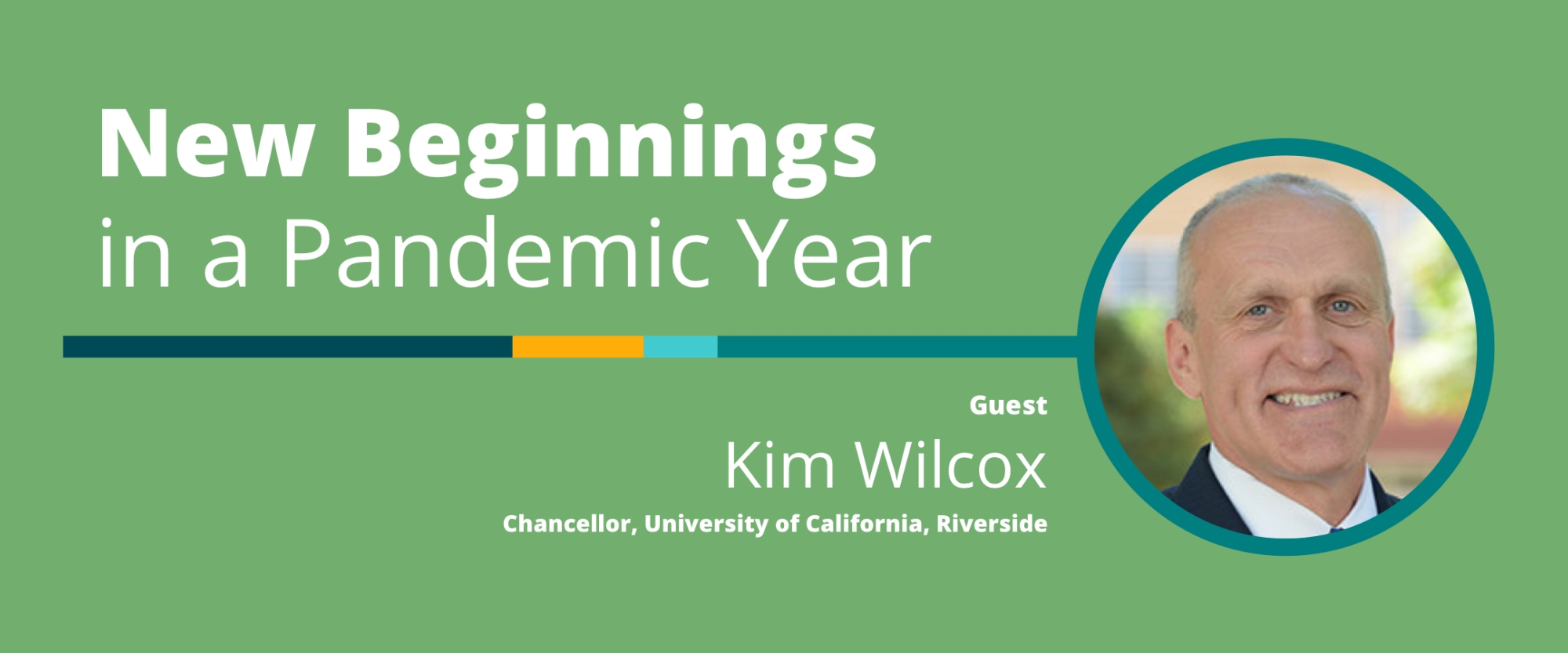Note: This interview, Episode 19 of the Weekly Wisdom Series, originally aired on September 28, 2020 as part of the University Innovation Alliance’s Innovating Together podcast, appearing live on Facebook, Twitter, and LinkedIn.
At the University Innovation Alliance (UIA), we're proud to present the Innovating Together podcast, a weekly broadcast that we've created with our friends at Inside Higher Ed. I'm Executive Director of the UIA, and my co-host is Paul Fain, Inside Higher Ed's Contributing Editor. In Episode 19 of Innovating Together's Weekly Wisdom series, we spoke with Dr. Kim Wilcox, Chancellor of the University of California, Riverside (UCR). Since 2013, Dr. Wilcox has overseen record improvements in Pell-eligible student success and the growth of an increasingly diverse faculty. He shared his wisdom about the unknowns and realities of beginning a new academic year during the COVID-19 pandemic, yet amid all the uncertainties, he finds plenty of reasons for optimism and inspiration.
Moving Ahead With Caution
When we spoke with Chancellor Wilcox on the first day of classes at U.C. Riverside, we asked how things had changed since the early days of the pandemic. "Middle of March, when everything went chaotic, there was like just day-to-day, day-to-day, day-to-day," he recalled. "Through the rest of the spring, I think most of us found a rhythm. One of the great things about universities is we have a cycle. And so I think the rhythm is partly now getting back to that regular cycle."
With U.C.R. on the quarter system, fall classes began later than at other schools, providing examples to follow (or avoid). "What we found as we watched the fall semester unfold across the country," he told us, "was some of our colleagues weren't cautious enough in their planning. We learned to be more focused on potential hotspots. Undergraduates and aggregate living is clearly a focus. So we took a pretty cautious, some would say conservative approach, from the beginning in our planning. We had a faculty committee that decided some principles for the fall. And one was everyone deserves a safe option, which meant that even if you're in a class with 30 students and you're the only student who doesn't want to go to back to face-to-face because you live with a family member who has health concerns, you deserve a safe option. And once you have that as a premise, then pretty much everything has to be at least a remote option."
Working With Budget Realities
As the leader of an institution with a history of successfully closing student achievement gaps, Chancellor Wilcox expressed his concern for U.C.R.'s more vulnerable students. "The pandemic has amplified inequity," he observed, "whether that's in healthcare or income or social programs. With the population on our campus over half Pell-eligible, first-generation students, we have a group who are already challenged in ways of support that other students around the country may not be. And this pandemic has meant we've had to redouble our efforts on campus through our food pantry and other support programs to do it the best we can. And I hope it's one of the messages that lives with us after the pandemic. I hope that after this period of obvious inequities across the country in higher education and elsewhere, that we as a nation will be better at addressing these realities."
COVID-19 has seriously impacted the university's budget. "This is my sixth budget cut," stated Chancellor Wilcox. "My first was as an assistant professor at the University of Missouri, so I was more the recipient of perspective on budgets than the purveyor. This one is unique. It has hit the entire university. We emptied our residence halls and closed down most of our dining facilities, kept the staff on payroll as long as we could. This is also unique in terms of the impact on the rest of society. This is not an easy time to be raising tuition, which was a solution in many other budget cuts over the years; simply not a socially responsible option in this environment with families struggling as they are. I think in every one of those past five cuts, we never returned to the same level of funding we had before. So we have to go into this with our eyes wide open. We can't be naïve about, well, the curriculum will bounce back and state funding will return – it has never returned, in my 40 years in higher education.
"But the other more heartening piece is our university has continued to thrive. So the trajectory remains upward. Remember, we're an industry of the mind. We still have our minds and we still have the opportunity to bring along students into this collection of scholars and learners. That's a pretty special thing. And if you stop and appreciate that, it's hard not to be inspired."
Models for Decision-Making and Interacting
Chancellor Wilcox acknowledged that, as a university leader, budget strategy is no longer something that happens to him – it's something that he has to drive. "Oftentimes, universities will put together a blue ribbon panel to advise on the budget strategy," he observed. "Why would we, in a time of reduced resources, invest more resources into a process to decide how to reduce resources? Let's instead rely on our existing strategies and people. We did that at Riverside. We're giving our campus a two-year planning time frame, which will hopefully give everybody a broader frame on their own unit, but also allow us centrally to think about how to bridge the different timelines across the units. A point of discussion right now is the return on investment on athletics. I'm not one who wants to close our athletics department, trust me, but we've got to find serious budget savings in this."
Sharing the ideas and data for such decisions can be challenging in a time of scheduled remote communications. "The data are the data," Chancellor Wilcox told us, "but you've got to have a conversation about the data. So the upside of Zoom is you can get to things pretty easily. I've actually been attending lots of classes that I never would have gotten to in the old days, because I can just click on a button and drop into a class for five or ten minutes. I get to talk to some students and so can get a flavor of things that was hard to get in a personal way before. We're getting better student attendance at meetings than we ever had before. But it's a different kind of social interaction – it's not nearly the same as 'catch me in the hallway afterward.'"
The Power of Supportive Culture
When we asked Chancellor Wilcox what federal or state policies would be the most beneficial for U.C. Riverside, he told us that government programs wouldn't be at the top of his list.
"The first is the culture," he began. "You have to have a culture that embraces, supports, and is committed to these students and their success. The second key element is having the people who are committed to the culture. We recruit more and more faculty and leaders who want to be part of this world. Once you have that platform, then you can start to think about programs. And the programs that work for one student generally work for all the students. And that's kind of the mindset we've brought to this.

"We can't backslide from where we are," he added. "We've redoubled our targeted programs like food pantry, and we have students, faculty, and staff who are organizing Highlander Connections to help entering students connect, and they describe themselves as a 'vibrant remote community.' That means connecting people in a real, engaging sense through this new medium. So we're exploring all those pieces, but you've got to have the bases of people and culture that are committed to them."
Envisioning a Hybrid Model
While the pandemic won't be with us forever, Chancellor Wilcox hopes to continue forward with some of the innovations forced by these difficult times. "I think we will have a different perspective collectively on the blend between face-to-face and distance," he said. "Most campuses are full of hybrid courses. Most campuses have online degrees and all the rest. We didn't do much of that on the administrative side. So there's an opportunity for us to think more holistically about this face-to-face and distance stuff, not just in the classroom setting, but across the rest of the university itself, and in our engagement with others across the community. We haven't realized as much on the instructional side for lots of reasons, good and bad, but I think it's going to be an easier piece to do some hot-seating on the administrative side."
The Bigger Picture
Like every higher ed leader we've interviewed, Chancellor Wilcox acknowledged the importance and difficulty of self-care. "I spend a lot of time suggesting, advising, recommending – you can't require – people to take time for themselves," he said. "I try to take as much of the weekend as I can, just because I need it. I sit here in front of this screen from 7:30 in the morning until 5:30, 6:00 at night, and I am beat. There's not enough time in the day to get done what needs to be done and what doesn't. I scan Inside Higher Ed every day, some other media as well. The arc of those stories – the COVID rise, students came back to campus, the reductions as they develop better testing – you don't need to know what every single school did. But to have a sense of what this arc is, to the extent to which it can inform your general trajectory, is how I approach most of the media these days."
He stays positive by keeping his focus on the U.C.R. campus. "It's everybody I talk with," he stated. "It's faculty senate leadership, the student body leadership, students in class. I live on campus, so as residents all move in, I'm on my bicycle meeting parents and students and custodial workers, and everybody is doing all they can to make sure that things are as good as they can be for our university, for the broader community, for their families. Every one of those people on campus has some good news to tell. They've done a great job of keeping the place running and moving ahead at a time when most of the broader conversation is about all of our problems, so that's where I get my inspiration. And Diane, my wife, walks on campus all the time. She comes back every day with a new story of somebody she ran into, what they're doing, what they've done, what they want to get done. It's pretty hard not to be inspired."
Links Mentioned in This Episode
• University of California, Riverside
• Highlander Connections (online community for first-year U.C.R. students)
Bios of Guest and Co-Hosts

Guest: Kim Wilcox, Chancellor, The University of California, Riverside
Dr. Kim A. Wilcox was appointed U.C. Riverside’s ninth chancellor in August 2013. During his tenure, U.C.R. saw historic growth across its education, research, and public service missions, including record improvements in student success, research funding, and philanthropic giving, as well as new schools of medicine and public policy. Chancellor Wilcox has grown faculty by nearly 25% while increasing its racial, ethnic, and gender diversity. He has guided the university toward becoming a national model for achieving student success, particularly across socioeconomic and ethnic categories. In the past five years, four-year graduation rates have increased by 16%, and six-year rates by 5%. U.C.R. is one of the few institutions nationwide that has eliminated graduation-rate gaps across income levels and ethnicity. Under Chancellor Wilcox’s leadership, U.C.R. became a charter member of the University Innovation Alliance. He has been an active participant on several higher education advisory boards and committees, currently serving on the NCAA Presidential Forum, the board of directors for the Coalition of Urban Serving Universities, and representing U.C.R. in the Council on Competitiveness. Dr. Wilcox served as provost at Michigan State University from 2005 to 2013, dean of the University of Kansas' College of Liberal Arts and Sciences from 2002 to 2005, and president and C.E.O. of the Kansas Board of Regents from 1999 to 2002. He also spent ten years as the chair of the Department of Speech-Language-Hearing at the University of Kansas. A first-generation college graduate, Kim Wilcox earned a B.A. in audiology and speech sciences from Michigan State, and master’s and doctoral degrees in speech and hearing science from Purdue University. He has directed teaching, research, and service projects on speech acoustics funded by the National Science Foundation and the U.S. Department of Education.

Co-Host: Bridget Burns, Executive Director, University Innovation Alliance
Dr. Bridget Burns is the founding Executive Director of the University Innovation Alliance (UIA). For the past decade, she has advised university presidents, system chancellors, and state and federal policy leaders on strategies to expand access to higher education, address costs, and promote completion for students of all backgrounds. The UIA was developed during Bridget’s tenure as an American Council on Education (ACE) Fellowship at Arizona State University. She held multiple roles within the Oregon University System, including serving as Chief of Staff and Senior Policy Advisor, where she won the national award for innovation in higher education government relations. She was a National Associate for the National Center for Public Policy and Higher Education, and has served on several statewide governing boards including ones governing higher education institutions, financial aid policy, and policy areas impacting children and families.

Co-Host: Paul Fain, Contributing Editor, Inside Higher Ed
Paul Fain joined Inside Higher Ed in September 2011 after six years covering leadership and finance for The Chronicle of Higher Education. He has also worked in higher ed P.R., with Widmeyer Communications, but couldn't stay away from reporting. A former staff writer for C-VILLE Weekly in Charlottesville, Virginia, he has written for The New York Times, Washington City Paper, and Mother Jones. His journalism awards include one for beat reporting from the Education Writers Association and the Dick Schaap Excellence in Sports Journalism Award. Paul got hooked on journalism while working at The Review, the student newspaper at the University of Delaware, where he earned a degree in political science in 1996. A native of Dayton, Ohio, and a long-suffering fan of the Cincinnati Bengals, he plays guitar in a band with more possible names than polished songs.
About Weekly Wisdom
Weekly Wisdom is an event series that happens live on Facebook, Twitter, and LinkedIn. It also becomes a podcast episode. Every week, we join forces with Inside Higher Ed and talk with a sitting college president or chancellor about how they're specifically navigating the challenges of this moment. These conversations will be filled with practicable things you can do right now by unpacking how and why college leaders are making decisions within higher education. Hopefully, these episodes will also leave you with a sense of optimism and a bit of inspiration.
Rate, Review & Subscribe
Learn why hundreds of people have rated this new podcast 5 stars! Please join others and rate and review this podcast. This helps us reach and inform more people -- like you -- to help increase the number and diversity of college graduates in the United States.
Click here, scroll to the bottom, tap to rate with five stars, and select “Write a Review.” Then be sure to let us know what you loved most about the episode! Also, if you haven’t done so already, subscribe to the podcast. We’ll be adding a bunch of bonus episodes to the feed and, if you’re not subscribed, there’s a good chance you’ll miss out.

